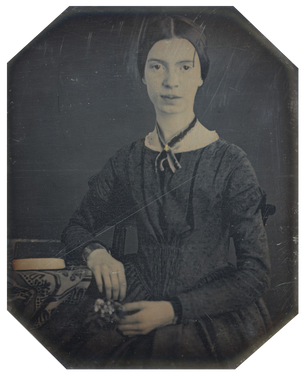“ ‘Hope' is the thing with Feathers"
| “Hope” is the thing with feathers - That perches in the soul - And sings the tune without the words - And never stops - at all - And sweetest - in the Gale - is heard - And sore must be the storm - That could abash the little Bird That kept so many warm - I’ve heard it in the chillest land - And on the strangest Sea - Yet - never - in Extremity, It asked a crumb - of me. Emily Dickinson |
Monsignor Ryan’s Reflections on “Hope” is the thing with Feathers
“ ‘Hope’ is the thing with Feathers” is one of the best known of Emily Dickinson’s poems. An extended metaphor, it likens the concept of hope to a feathered bird that is permanently perched in the soul of every human. There it sings, never stopping in its quest to inspire.
Full of figurative language it reminds us that hope springs eternal. The rhythm of the poem varies which may not be apparent at first reading. Readily set to music, the words are a reminder of the poet’s yearning for fulfilment in both creativity and love. They beautifully encapsulate what hope is for us all – something that inspires and can make us fly.
“ ‘Hope’ is the thing with Feathers” is one of the best known of Emily Dickinson’s poems. An extended metaphor, it likens the concept of hope to a feathered bird that is permanently perched in the soul of every human. There it sings, never stopping in its quest to inspire.
Full of figurative language it reminds us that hope springs eternal. The rhythm of the poem varies which may not be apparent at first reading. Readily set to music, the words are a reminder of the poet’s yearning for fulfilment in both creativity and love. They beautifully encapsulate what hope is for us all – something that inspires and can make us fly.
Emily Dickinson 1830 – 1886
Emily Dickinson an American poet was born in Massachusetts. Her father was from a prominent American family. He was actively involved in both state and national politics.
Emily Dickinson’s poetry was heavily influenced by the metaphysical poets of 17th century England, as well by the Book of Revelations (Apocalypse) and her upbringing in a Puritan New England town which encouraged a Calvinist, orthodox and conservative approach to Christianity.
She was not publicly recognised during her lifetime but upon her death her family discovered 1800 poems covering a wide variety of subjects.
Emily Dickinson an American poet was born in Massachusetts. Her father was from a prominent American family. He was actively involved in both state and national politics.
Emily Dickinson’s poetry was heavily influenced by the metaphysical poets of 17th century England, as well by the Book of Revelations (Apocalypse) and her upbringing in a Puritan New England town which encouraged a Calvinist, orthodox and conservative approach to Christianity.
She was not publicly recognised during her lifetime but upon her death her family discovered 1800 poems covering a wide variety of subjects.

 RSS Feed
RSS Feed